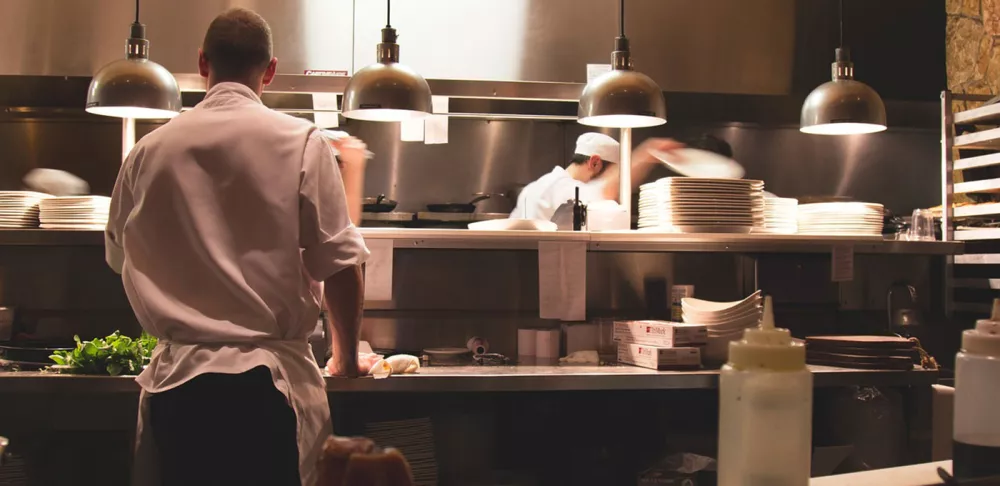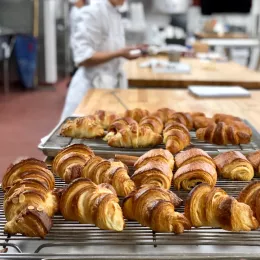Keeping a clean workspace and the appropriate handling of various types of food are principles that are emphasized throughout culinary school, but they aren’t just common sense practices. Food safety also has legal and ethical implications if you plan to work in a restaurant or other foodservice setting.
“Food safety is fundamental to all areas of professional culinary arts,” says Lachlan Sands, President of the Institute of Culinary Education's Los Angeles campus. “From a philosophical perspective, we are asking our guests to trust us with something very personal. We are asking them to place their faith in us that the food that they are about to consume is safe and healthful.”
Restaurant food safety guidelines are emphasized throughout culinary school, and students who go on to work in restaurants or other foodservice settings should expect to deal with aspects of restaurant food safety throughout their careers.
“Whether you work in fine dining or fast food, the credo is always the same,” Chef Lachlan says. “Food safety is paramount.”
Here we explore several aspects of food safety in restaurants whether you are considering culinary school, already enrolled or just want to feel secure in the choices you make when dining out.
What is Restaurant Food Safety?
Restaurant food safety consists of various guidelines, maintained by both the national and state governments, that inform not only how food should be handled, but every aspect of cleanliness and hygiene when it comes to a professional food preparation environment. While food safety for restaurants has public health implications, these guidelines are also good practices when it comes to preparing food at home. Developing good habits where food safety is concerned is valuable for both professional chefs and home cooks alike.
Restaurant food safety guidelines fall into a number of different categories, including things such as handwashing, food storage, cooking temperatures, hot and cold holding parameters, equipment, infrastructure and even water requirements.
How is Restaurant Food Safety Taught in Culinary School?
Students will deal with issues related to food safety throughout their culinary school curriculum, from specific lessons that focus on restaurant food safety guidelines to the day-to-day practice of maintaining these guidelines.
“We discuss it in all forms,” says Chef Joshua Resnick, Lead Chef and Operations Manager for ICE New York. “From personal hygiene and uniform to proper internal cooking temperature for proteins, and ways to prevent cross-contamination of different products.”
In addition to various cooking techniques, restaurant food safety guidelines will be some of the most important lessons that students are required to master in culinary school.
What Are Some of the Most Intuitive Guidelines When It Comes to Restaurant Food Safety?
Students will often begin culinary school with a decent idea of certain restaurant food safety principles just based on how they operate at home in the kitchen.
“Students know intuitively that you should wash your hands here and there, that raw food should not sit out, and that things that fall on the floor are potentially hazardous,” Chef Lachlan says. “There is no five-second rule.”
“I think that most students coming into the program know more than they think they know about food safety, especially in a post-COVID world,” Chef Joshua says. “Things like washing hands when walking into the kitchen, coughing or sneezing into the crook of your elbow and not touching your phone while cooking are all things we do normally."
Chef Joshua says students often start with at least an idea of proper internal cooking temperatures for certain proteins, whether that’s from reading recipes or learning from food media where cooking thermometers are often utilized.
What Aspects of Restaurant Food Safety Are More Difficult to Learn?
While certain aspects of food safety in restaurants can be intuitive, there are other aspects that can take students by surprise, or that may take longer to master when it comes to developing good habits. Even with intuitive things such as hand washing, “the stringency and frequency of the rules,” may be new to students, according to Chef Lachlan.
The steps to preventing cross-contamination, in particular, are more numerous than one might expect.
“I don’t think students are aware of just how much of what they do in the kitchen has one or multiple elements of food safety that goes into it,” Chef Joshua says. “Even the idea of fabricating a chicken: you have to ensure that you are working on a clean board that is safely anchored to the table, there is a container of sanitizer solution, a towel completely submerged in the solution while using gloves to handle the chicken before transporting it to your board in a vessel. Skipping any of those steps can lead to issues down the line, which is why we stress the importance of food safety all of the time.”
Chef Lachlan also notes the undoing of certain bad habits as being an area where students may struggle.
“Fighting your cultural tendencies, which usually has to do with family habits [can be challenging,]" he says. “Hand washing, cleaning vegetables, proper storage and everything else all have different rules at home. My mother, for example, used to thaw frozen ground beef on the roof of our house. Just because a dangerous habit works at home a few times a year does not mean it is safe when scaled up to hundreds of meals a day in a commercial environment. Also, you are less likely to be sued by family members if you make them sick; not so in a restaurant environment.”
Infractions of food safety regulations can not only lead to litigation but can also lead to restaurant closure, which isn’t a risk you should be willing to take with a restaurant or any foodservice business.
“The health department can close you instantly and severely damage your reputation,” Chef Lachlan says.
Is a Food Handler’s License Important for Food Safety?
Food safety regulations for restaurants and food handling licenses are different from state to state. (See here for a breakdown of different food safety certifications available by state.)
Not only is a food handler’s license important when it comes to restaurant food safety, but depending on your role it may be required.
“From a legal perspective it is required in most jurisdictions,” Chef Lachlan says. “From a business perspective, it is also important to learn how to keep your guests safe. We rely on repeat business and the day you make a guest sick is the day they don’t come back.”
Additionally, mastering food safety and pursuing certification can also be a savvy professional move on a student’s part.
“Every restaurant needs someone who is certified on-site at all times that the restaurant is open,” Chef Joshua says. “I always tell my students that if you can earn your certification before leaving school, it also shows future employers that you are dedicated to your craft, and can make you a more attractive candidate.”






